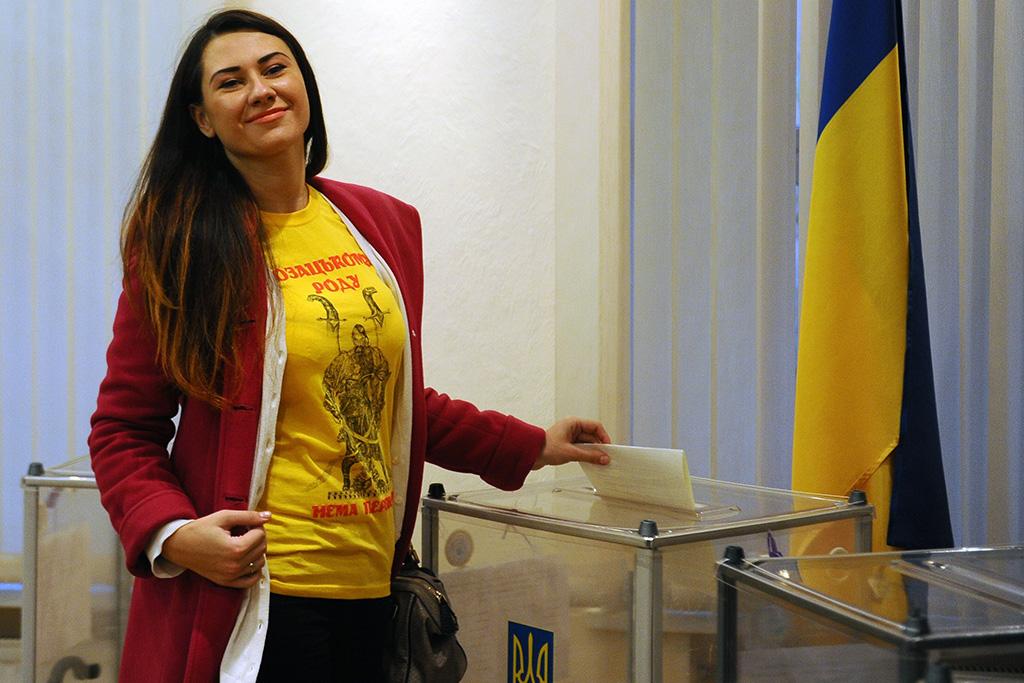Why Ukraine needs more women in parliament
A Ukrainian woman shows her t-shirt with a traditional Ukrainian symbol as she casts her ballot at a polling station in the Ukrainian Consulate in St. Petersburg on October 26, 2014.
KYIV, Ukraine —In the Millennium Development Declaration, signed by 189 countries, Ukraine declared that by 2015 women’s representation in parliament would reach 30 percent. The country accepted the obligation to create favorable conditions for that development.
It appears that Ukraine will not achieve this goal.
Women’s participation in decision-making is, once again, left behind on the political agenda. Instead of honoring commitments made to women, who comprise 60 percent of the electorate, the country seems to have decided to deal with war first and think about women later.
Women comprised 9.9 percent of the previous Ukrainian parliament and comprise 11.1 percent of the new parliament. In the 2014 Global Gender Gap Report, Ukraine is ranked 105th out of 142 countries in terms of political empowerment of women.
The fight for women’s representation is not about political correctness or nominal inclusion. Larger representation of women matters because when women hold least 30 percent of the seats in decision-making bodies, the pace of the country becomes more balanced: education, health care, and social infrastructure move to the top of political agenda, with adequate state funding allocated to these priority areas.
Evidence shows that there is a correlation between equal representation in parliaments and peace and stability.
In the Global Gender Gap Report, for example, Iceland, Finland, Norway, Sweden, Denmark and Switzerland are ranked in the top 10 in terms of political empowerment of women. In the 2013 World Happiness Report, all six of these countries are also listed in the top 10 countries to live in.
Ukraine has been through a lot to redraw the country with an eye to developments of peace, equity and systemic change. Women’s representation in government will affect the country’s ability to create this change.
The main obstacles to women’s representation are systemic: political, economic and cultural. There are no programs in Ukraine that support women in balancing careers with parenting, nor are there policies that support women’s leadership at the national level.
Women candidates usually do not have funding to run for office. Too often, women themselves don’t believe they can achieve higher office. Facing long, unproductive fights against stereotypes and systematic barriers, women often decide to give up.
During the recent parliamentary elections, in six districts of the Zakarpattya region, there were no female candidates on the ballots nominated by political parties. Only four women were self-nominated, and one withdrew from the race prior to the election.
The solution to this complex problem requires comprehensive strategies. But none will be successful without quotas for women’s representation.
Representation increases when policy has given women a boost. This year, only a few months before the elections, Ukrainian law on political parties was amended to state that no less than 30 percent of the candidates on party lists submitted to the central election committee should be women.
But this was not a demonstration of political will of the state to change the status quo. Rather, it was a formality, something to show in case Ukraine is challenged by the international community.
Political parties often don’t know about this principle, ignore it or implement at their own discretion.
On Ukraine’s ballots, parties list approximately 200 candidates. But in the majority of elections, only a few women are among the first 50 names on the list, while many women are included in the last 50 names.
Most European countries have established effective quotas through legislative action. Ukraine, having signed the Association Agreement with the European Union, should also implement the principles that have long and successfully worked in the EU.
The women of Ukraine, alongside men, have paid and continue to pay a very high price for creating a new, just society. They have sacrificed for equality in politics and a government populated by new faces. They want female faces among them. Anything else is unequal and unjust.
Natalia Karbowska is president of the Ukrainian Women’s Fund.
More from GlobalPost: Violence in eastern Ukraine seems endless now — here's how we got there
Every day, reporters and producers at The World are hard at work bringing you human-centered news from across the globe. But we can’t do it without you. We need your support to ensure we can continue this work for another year.
Make a gift today, and you’ll help us unlock a matching gift of $67,000!
